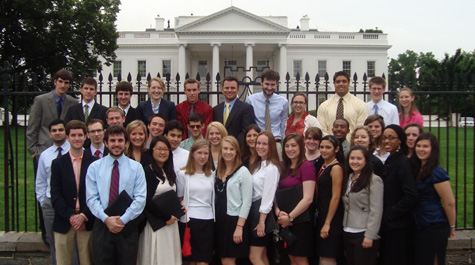D.C. Summer Institutes combine classroom, experiential learning
This summer, 34 William & Mary students are participating in the W&M D.C. Summer Institutes (DCSI), a competitive six-credit academic program that allows undergraduate students to combine classroom and experiential learning while seeing the dynamic institutions of the Washington, D.C. area firsthand.
D.C. Summer Institute classes met for two weeks at the start of the summer on an accelerated schedule. Included in the class were numerous speakers and site visits related to their specific themes. Now that the academic classes are complete, the institute fellows are working at their internship sites for the remaining 10 weeks of the summer. Fellows receive three credits for their coursework and additional three credits for the academic work they complete in association with their internship.
In 2011, the D.C. Summer Institutes included:
- The Community Engagement Institute, a joint venture between the W&M Washington Office, the W&M Office of Community Engagement & Scholarship, and the W&M School of Education, is taught by Director of Community Engagement Drew Stelljes, focusing on leadership in nonprofits.
- The Security Institute, a joint venture between the W&M Washington Office, the Institute for the Theory and Practice of International Relations, the W&M Department of Government, is taught by former Government Department Professor Elizabeth Arsenault ’02, focusing on U.S. national security policy.
Over the past two weeks, fellows in the Community Engagement Institute had the opportunity to meet with John Bridgeland, founder of Civic Enterprises; Nancy Gofus ‘75, Board Chair for the Volunteers of America, and Michael Powell ‘85, former rector for the College, and now president of the National Cable & Telecommunications Association, among others. Site visits for the Community Engagement Institute included the White House, D.C. Central Kitchen, Anacostia High School, National Conference on Citizenship, and Civic Enterprises.
Sophomore Rachel Fybel expressed her enthusiasm for the program saying, “I feel so privileged to have the opportunity to witness firsthand the practices that we study in class. The site visits really help different leadership theories come to life.”
Security Institute site visits included the White House, the Pentagon, the State Department, the Senate Foreign Relations Committee, National Counter Terrorism Center, the CIA, the National Cryptological Museum, and PricewaterhouseCoopers. Students had the privilege of meeting with policy leaders like Daniel Byman, terrorist expert with the Brookings Institution, Marta McLellan Ross, Foreign Affairs Legislative Assistant to Senator Jim Webb (D-VA) and Michelle Flournoy, Assistant Secretary of Defense on Policy.
Arsenault noted that the site visits and speakers were “truly an incredible educational experience for a professional in the national security field, let alone an undergraduate student starting out their careers.”
On May 30, the institute fellows began their internships
in the D.C. area. The 10-week internship experience allows them to apply
concepts that they learned in the classroom to a real world setting. Among the
34 internship sites are: Coast Guard, Customs and Border Protection, Defense Intelligence Agency, National Defense University, Pulitzer Center for Crisis Reporting, Stimson Center, The Department of Justice, The U.N. Foundation, Transportation Security Administration, Boys and Girls Club of America, Civic Enterprises, Environmental Law Institute, Global Playground, Jane Goodall Foundation, NAACP, Urban Prep Charter School, Virginia Poverty Law Center, and Volunteers of America.
In describing the lasting affects of the DCSI
program, Stelljes said, “The D.C. Summer Institutes build stronger connections
between student experiences within and beyond the classroom, fostering
students’ personal as well as intellectual development.”
Summer 2012 institute topics and application deadlines will be announced in early September.















